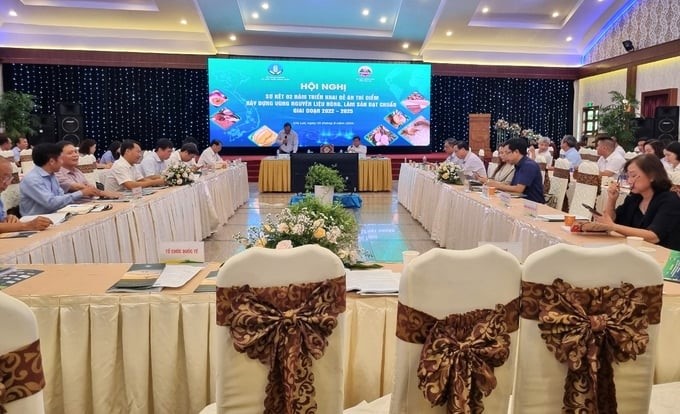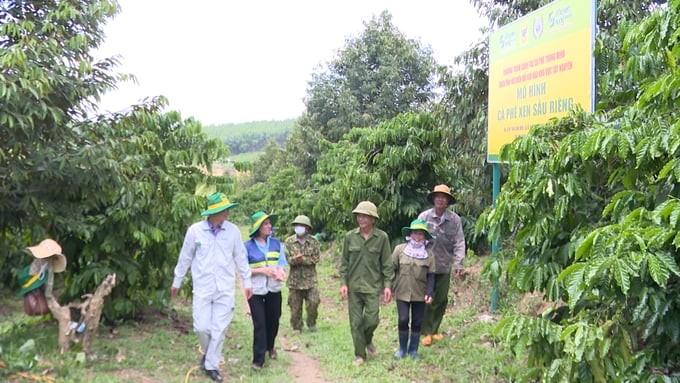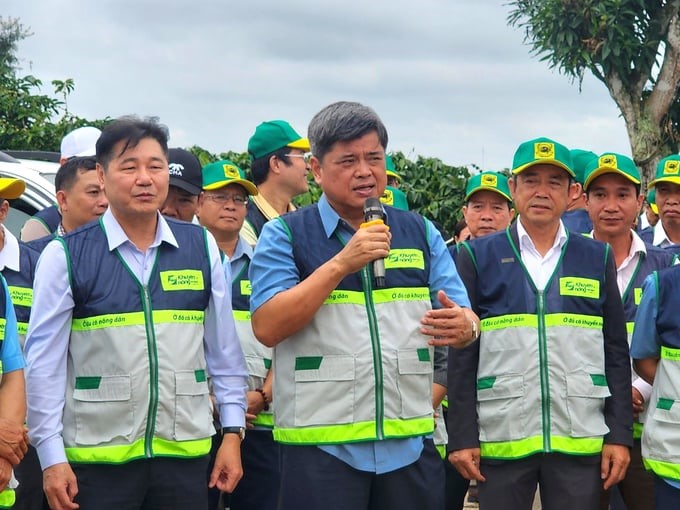May 20, 2025 | 09:11 GMT +7
May 20, 2025 | 09:11 GMT +7
Hotline: 0913.378.918
May 20, 2025 | 09:11 GMT +7
Hotline: 0913.378.918

Preliminary conference on 2 years of implementing the pilot project to build standard agricultural and forestry raw material areas for the 2022–2025 period in Gia Lai. Photo: Tuan Anh.
On August 1, MARD coordinated with the Gia Lai Provincial People's Committee to organize a preliminary conference on 2 years of implementing the pilot project to build standard agricultural and forestry raw material areas for the 2022–2025 period (hereinafter referred to as the Project). Deputy Minister of Agriculture and Rural Development Tran Thanh Nam chaired the conference.
After 2 years of implementing the Project, five pilot raw material areas have basically clearly formed and developed in both area scale and operational quality.
Specifically, 82/131 km of raw material area infrastructure has been completed; 2/5 electric pumping stations and 3/8 warehouses and product display houses have been built. The total medium-term capital of the raw material area infrastructure project invested by MARD has been disbursed at VND 220 billion out of a total of VND 440 billion.
The area of raw material areas in consumption linkage with businesses reached over 103,000 hectares. Of which, 81 linkage chains were built, an increase of 56 chains compared to the initial time of implementing the Project. 26 agro-product purchasing and processing businesses and 353 cooperatives participating in the linkage. 130 community agricultural extension groups have been established, of which the National Agricultural Extension Center established 26 groups and the provinces established 104 groups.
According to the assessment of MARD's Department of Economic Cooperation and Rural Development, infrastructure works in raw material areas have been constructed and handed over to the locality. Of which, traffic roads and irrigation canals were completed, creating conditions for the circulation and transportation of raw materials from production areas to the factory.
On the other hand, a system of community agricultural extension groups in raw material areas has been formed to advise and provide technical support on production, market linkage, and cooperative development.
Localities have also focused on effectively implementing linkage projects, applied the GAP process and rice land support policies, and mobilized the participation and large amount of reciprocal funding from cooperatives and businesses.

Standard coffee raw material area in Dak Ha district (Kon Tum province). Photo: Tuan Anh.
After implementing the Project, Gia Lai province has reaped certain results. Specifically, Gia Lai has formed and developed a coffee raw material production area on a large, concentrated commodity, modern scale, applying advanced technology. At the same time, develop over 12 agricultural cooperatives in sustainable coffee raw material areas with processing and export businesses in 7 districts and cities.
Regarding transportation infrastructure, more than 12 km of roads leading to the raw material production areas of 4 agricultural cooperatives have been upgraded. Civil works for 1 cooperative have been supported with a total cost of VND 26.33 billion.
In order to effectively implement the Project, the Gia Lai Provincial People's Committee requested that MARD consider and approve the land location to build the Gia Lai logistics center in Dak Doa district. At the same time, the Ministry will soon have documents guiding implementation and considering additional investment in 1.2 km of on-farm roads for La Ring Agricultural Production, Business, and Services Cooperative; 0.2 km of on-farm roads for Nghia Hoa Agricultural Cooperative; and 3,000 m2 of concrete yard for Dak Rong Agricultural and Service Cooperative to serve drying and processing quality coffee.
The representative of the Dak Lak Provincial People's Committee said that the implemented Project contributes to developing standard agricultural and forestry raw material areas on a concentrated scale on the basis of sustainable linkage with processing and consumption businesses, meeting the requirements of domestic and foreign markets, and promoting and restructuring the agricultural sector in the context of economic integration and the challenges of climate change. The Project has created motivation and awakened development potential for the province, contributing to hunger eradication, poverty reduction, and building new rural areas.
To more effectively implement the Project, the Dak Lak Provincial People's Committee hopes that MARD will pay attention and facilitate for the province in the process of completing legal procedures on land of cooperatives according to regulations. Besides, prolong the construction time and progress of project items such as product display houses and coffee warehouses of cooperatives. MARD is also interested in and will soon allocate direct funds to implement the Project on schedule so that localities can coordinate implementation and integrate the Project's contents and tasks.
On the other hand, Dak Lak will also coordinate with Ministries and branches to promulgate policies to attract and encourage investment in developing concentrated specialized agricultural production areas and provide financial support for crop restructuring in inefficient coffee areas lacking water resources for other crops. At the same time, support the implementation of digital transformation for the crop production sector.
Since 2021, MARD has provided timely directions in building raw material areas and focused on supporting production, services, and production infrastructure in raw material areas.
Agricultural extension activities also have positive changes, shifting from production support to services. When it comes to agricultural extension, agricultural workers refer to it as a national brand.

Deputy Minister Tran Thanh Nam and the community agricultural extension group visited the standard coffee raw material area model. Photo: Phuong Chi.
Ms. Tran Thi Lan Anh, Deputy Director of Vinh Hiep Co., Ltd. (Gia Lai province), said that in recent times, to build a sustainable coffee production network according to international standards, the company has deployed a group of field staff and technical staff, including the participation of community extension officers to accompany coffee farmers, update situations in raw material areas, and contribute to solving problems and challenges, ensuring sustainable development.
"We are always proud of the community agricultural extension group, considered as a companion jointly participating in technical transfer, digital transformation, creating linkage chains, and working with local people to access multi-value agriculture with high added value, including coffee," said Ms. Lan Anh.
Speaking at the conference, Deputy Minister of Agriculture and Rural Development Tran Thanh Nam said that basically, the Project has formed five standard raw material areas in 13 pilot provinces and cities. The Project ensures the planning requirements of raw material areas in localities. Currently, when it comes to coffee, rice, or forests, we have shown the standard raw material areas, which is the biggest highlight that the Project has achieved.

Deputy Minister Tran Thanh Nam spoke to direct the conference. Photo: Tuan Anh.
However, to form standard raw material areas that meet the requirements of the agricultural sector, there are still many difficulties, so the participation of investors and businesses is extremely needed.
According to Deputy Minister Tran Thanh Nam, developing standard raw material areas will be the basis for consolidating and perfecting production organization for the agricultural sector. At the same time, effectively revive agricultural extension activities.
On the other hand, building raw material areas has changed the thinking of production along linkage chains, improving product value. The most difficult problem today is the linkage chain, but when participating in the raw material area, this problem will be solved.
"There must be standard raw material areas for the agricultural sector to get on track, then MARD can focus on effective support policies. It is also the raw material areas that are the basis for reinforcing local production organizations," emphasized Deputy Minister Tran Thanh Nam.
Translated by Thu Huyen

(VAN) Vietnam aims to become a 'leader' in the region in the capacity and managing effectively soil health and crop nutrition.
![Reducing emissions from rice fields: [Part 1] Farming clean rice together](https://t.ex-cdn.com/nongnghiepmoitruong.vn/608w/files/news/2025/05/05/z6509661417740_a647202949c539012a959e841c03e1d3-nongnghiep-143611.jpg)
(VAN) Growing clean rice helps reduce environmental pollution while increasing income, allowing farmers to feel secure in production and remain committed to their fields for the long term.
/2025/05/19/5136-1-144800_230.jpg)
(VAN) The Nghe An Provincial People's Committee has just approved the list of beneficiaries eligible for revenue from the Emission Reductions Payment Agreement (ERPA) in the North Central region for the year 2025.

(VAN) 14 out of 35 domesticated elephants in Dak Lak province have had their living conditions improved, with 11 of them currently participating in the non-riding elephant tourism model.

(VAN) Muong Nhe Nature Reserve hopes that being upgraded to a national park will lay the foundation for forest protection efforts to be carried out in a systematic, modern, and sustainable manner.
/2025/05/16/3923-2-171845_52.jpg)
(VAN) Lower costs, higher yields, and improved soil quality are outstanding benefits that soybeans bring when integrated into the crop rotation system.

(VAN) The 'For a Green National Environment' programme aims to promote a green lifestyle, support businesses in implementing ESG practices, and turn Net Zero commitments into concrete actions.